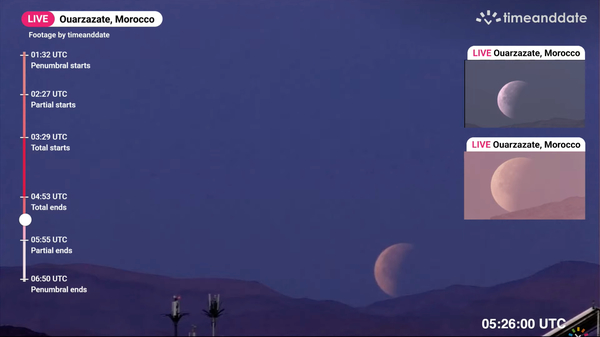timeanddate at the Europlanet Science Congress 2022: September 18–23
We’re collaborating with specialists worldwide to host two sessions focussing on public engagement and the live coverage of celestial events.

First held in 2006, the Europlanet Science Congress covers a broad area of topics related to planetary science. The 2022 congress takes place in Granada, Spain.
©iStockphoto.com/WillSelarep
Engaging the Public in Science
timeanddate is bringing together researchers and other experts to focus on how astronomy live streams can engage the public in science.
In recent years, particularly since the start of the COVID-19 pandemic, many professional and amateur groups have become involved with streaming astronomical events to the general public.
Building on the success of these projects, we’re helping organize a session of presentations, discussions, and networking at the Europlanet Science Congress (EPSC) 2022 on Monday, September 19.
EPSC is the largest planetary science meeting in Europe. This year’s event is being held at the Palacio de Congresos in Granada, Spain, from September 18 to 23.
The co-organizers of our session are Claudia Mignone of the National Institute for Astrophysics (INAF) in Italy, and Helen Usher at the Open University in the UK.
An Invitation to Join Us
EPSC2022 will take place as an in-person meeting, without virtual participation. Therefore, we’ll also be hosting a global, online version of our session later in the year—on Wednesday, November 23 (starting at 12:00 UTC).
The title of our session is Public engagement via live online astronomy events: Sharing experiences, looking ahead.
Anyone who is involved with providing live coverage of astronomical events—in any part of the world—is invited to join our online session on November 23: please get in touch with Graham Jones via graham@timeanddate.com
Coming Up in Granada
In the meantime, the presentations and talks to be featured in our session in Granada on September 19 include the following.
- Federica Duras of INAF will present the lessons learned from a live-streaming project aimed at an Italian audience called “Il cielo in salotto” (“The sky in your living room”)
- From the European Space Agency (ESA), Miguel Pérez-Ayúcar will explain how the Cooperation through Education in Science and Astronomy Research (CESAR) is providing live coverage of solar events such as eclipses, and transits of Venus and Mercury
- Helen Usher will explain how live streams and astronomy software saved the day in “A case study from a partial solar eclipse in cloudy Wales”
- Mert Acar, part of the ISTEK Belde Schools Science Center in Istanbul, will talk about how museum tours and planetarium shows are being carried into the virtual medium
- Alessandro Marchini will show how the Astronomical Observatory at the University of Siena has been updated for remote research and live shows
New Data from timeanddate
In addition to chairing the session at EPSC2022, timeanddate will present data on some of the notable forthcoming celestial events, from solar eclipses to planetary groupings.
As part of this, we’ll be sharing new projections of the resident population in areas where eclipses and transits will be visible. These figures are based on population models developed by the Center for International Earth Science Information Network (CIESIN) at Columbia University.
Exchanging Ideas
“For our first live stream—a transit of Mercury in 2016—we simply put an amateur telescope on the balcony outside our offices,” said Steffen Thorsen, timeanddate’s CEO.
“But for our most recent live stream, which was the May 2022 total lunar eclipse, we traveled over the Atlas Mountains and set up a mobile observatory on the edge of the Sahara desert. We also set up a streaming server for our partners in the US, Canada, and Chile, and we hosted a four-hour live show from our in-house studio.
“So we’ve learned a lot over the past six years, and we’re looking forward to the exchange of ideas that will take place through these Europlanet sessions.”

An eclipsed Moon sets over the Sahara desert in May 2022—captured by the timeanddate mobile observatory.
©timeanddate